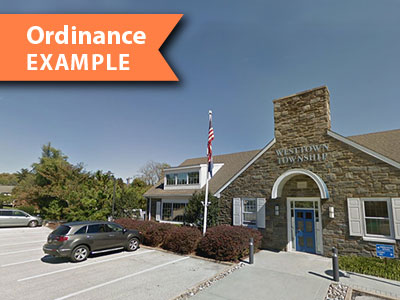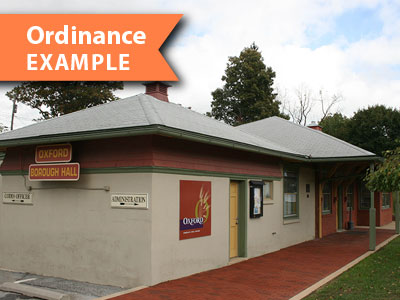
Many professionals can reasonably and effectively operate as a home-based business, indistinguishable from other homes in their neighborhood, without the need for traditional office or commercial space to be successful and profitable.
How it Works
Home-based businesses enable residents to utilize their home as their workplace to meet the changing needs of the workforce or to generate additional income for the household. Home-based businesses can be categorized as no-impact or major, but must clearly be secondary to the primary use as a residential dwelling. Municipalities can ensure home-based businesses do not negatively impact or detract from the residential nature of their surroundings by addressing the use in their planning policies, zoning ordinances, and through education of the public regarding their benefits and the need for regulation.
Benefits
Increased Economic Base
The ability to establish a home-based business can encourage entrepreneurial innovation, as well as provide additional income for residents and homeowners resulting from reduced overhead in business operations.
Aging Population Support
Home-based businesses can provide opportunities for a senior to continue to fully participate in the labor force, and provide a source of income after retirement..
Existing Infrastructure Efficiencies
As home-based businesses are operated within existing properties, expanded use of existing infrastructure can be realized.
Energy Savings
The ability to work from home eliminates commuting costs, can lessen traffic and congestion, and can reduce greenhouse gas emissions.
Reduced Neighborhood Conflicts
By implementing appropriate regulations to address home-based businesses, a municipality can prevent impacts on neighboring properties avoid potential complaints.

As the needs of the workforce continue to evolve, the ability to work from home has become an attractive option for many as all municipalities are required to allow "no-impact" home-based businesses as a by-right use.
Get Started
Home-based businesses are regulated through the zoning ordinance and are generally divided into two categories with differing ordinance standards based on their size and potential impacts. The Pennsylvania Municipalities Planning Code (MPC) mandates that all municipal zoning ordinances permit "no-impact" home-based businesses by-right in all residential zoning districts. As defined by the MPC, a no-impact home-based business cannot generate traffic, deliveries or other functions, to or from the premises, in excess of those normally associated with a residential use. (See "resource links" for complete MPC language.) The MPC further outlines specific criteria these home-based businesses must abide by in order to be classified as no-impact. If a municipality determines a home-based business is in excess of the criteria for "no-impact" as defined by the MPC, that business may be prohibited by the municipality from continuing from the residence and appropriate enforcement action taken to stop it.
A municipality may also choose to permit a home-based businesses that exceeds the limitations of a "no-impact" as "major" if desired. After the Zoning Officer makes a determination of whether a home-based business is no-impact or major, regulatory provisions for major home-based businesses should be in place to address possible impacts of the business on neighboring properties. Larger home-based businesses are often regulated as special exceptions and the locations where they are permitted may be more limited. It is essential to have appropriate provisions in place to both protect and respect the residential nature of where they operate.
Issues to be considered and addressed in regulatory standards, in addition to applicable standards allowed for no-impact home-based businesses, include:
- Whether the business will permitted by-right, by conditional use, or by special exception. If a municipality develops robust standards, allowing a major home-based business by right may be appropriate. Otherwise, having a public process completed as a conditional use or special exception may be appropriate to ensure impacts that may be unique to a specific neighborhood are addressed.
- Whether the business will be permitted only in the principal dwelling and/or an accessory building. Some municipalities have a prohibition on allowing home-based businesses in accessory buildings as the scale may be inappropriate for the existing neighborhood. Limitations on the amount of square footage utilized for the business in an accessory building can address this concern.
- Limitations on the structural appearance to ensure the premises retains its residential character. As home-based businesses are intended to be indistinguishable from surrounding residential properties, structural alterations inconsistent with surrounding neighborhood should be discouraged. Architectural renderings could be required as part of any application for a major home-based business to ensure consistency with the established neighborhood.
- Prohibition on the exterior parking of commercial vehicles and/or exterior storage of materials related to the business. A municipality should develop a clear definition of what encompasses a commercial vehicle and apply this standard to vehicles utilized as part of a home-based business. Exterior storage of materials associated with a home-based business should be prohibited and consideration should be given to whether or not an accessory building can be used for this purpose.
- Limitations on having employees that do not reside at the premises. Most municipalities have a prohibition on allowing non-residents of the home report to the residence for work. Consideration could be given to allowing a limited number of non-residents reporting to work from the residence if issues such as parking and overall appearance of the residence are addressed.
- Limitations on having customers visit the premises. Most municipalities have limitations on allowing customer visits to the residence for goods and/or services. Consideration could be given to allowing a limited number of customers visiting the residence if issues such as parking and overall appearance of the residence are addressed.
- Limitations on hours of operation. For businesses that include customers visiting the premises for services (i.e. home salon/barber, cosmetology, veterinary clinic, photography studio, etc.), consideration should be given to limiting hours of operation that respect the residential nature of the surrounding neighborhood.
- Limitations on the total square footage of the premises to be utilized for the business. As a home-based business is an accessory use, it should not encompass the majority of the space in the residence. The municipality can have a hard cap on the allowable amount of square footage available for these businesses or a sliding scale based on a set percentage of the total square footage of the residence. If a sliding scale approach is used, the municipality may still wish to set an upper limit on the allowable square footage.
- Limitations on allowable signage. As these businesses are intended to be indistinguishable from surrounding residences, many municipalities prohibit on-site signage for the businesses. If signage is permitted it should be scaled-down and minimized so as not to detract from the overall residential nature of the surrounding neighborhood.
- Limitations on the allowable number of home-based businesses at a single residence. Some municipalities limit the number of home-based businesses allowed at a residence to only one. Allowances for more than one may be appropriate based on the type of business at the residence or for larger residences.
- Additional parking requirements. If the business involves employees and/or customers reporting to the residence, additional on-site parking may be required. Consideration should be given as to where these parking spaces are located as well as what type of screening may be required.
- Limitations to the sale or provision of products or services made on-site versus those coming from an off-site location. Some municipalities limit the sale of products from a home-based business to that of only products produced on-site. This is generally done to prevent excessive truck deliveries as well as to minimize issues related to the storage of goods for sale at the premises.
Related to regulating and permitting major home-based businesses, municipalities need to determine any ongoing inspection process, to ensure these businesses are compliant with municipal standards. This can be accomplished through an annual registration of major home-based businesses that have the operator certify they are in full compliance with all applicable regulations. A permitting process should also be considered for no-impact businesses to assess whether they have grown into the "major" category.

For larger or more impactful home-based businesses, municipalities should develop clear standards for their operation to minimize their impacts on neighboring residential properties.
Considerations
Neighborhood compatibility
Since home-based businesses are generally located in established residential neighborhoods, regulatory provision should be developed to best integrate these businesses seamlessly into the existing built environment. Compatibility with neighborhood character should be taken into consideration when major home-based businesses are permitted.
Neighborhood opposition
Although home-based businesses are common throughout Chester County, lack of familiarity with this practice may cause pushback from adjacent residents. Consideration should be given to the development of fact sheets with local examples of home-based businesses to educate the public on the issue.
Existing unregulated businesses
Municipalities may have existing unpermitted, major home-based businesses and may want to create a system to incentivize these businesses to be properly permitted.

Westtown Township
Section 170-1605 of the Westtown Township Zoning Ordinance provides standards for various types of home-based businesses in all residential districts.

City of Coatesville
Section 224-59.B.2.c of the City of Coatesville Zoning Ordinance provides standards for various types of home-based businesses in all residential districts.

Borough of Oxford
Section 27-1304 of the Borough of Oxford Zoning Ordinance provides standards for various types of home-based businesses in all residential districts.


